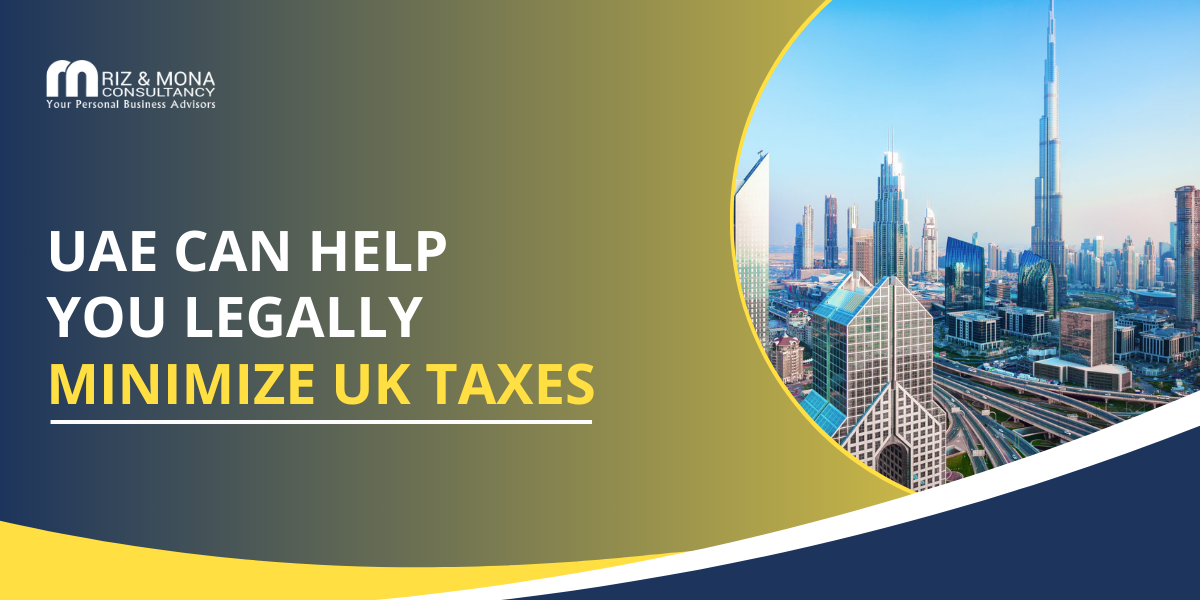Capital Gains Tax: Keeping Your Investment Returns
In the UAE, there is no capital gains tax on the sale of most assets, including real estate, stocks, and businesses. This tax-free status allows investors to fully retain the gains from their investments, making the UAE an attractive option for wealth preservation and growth.
Conversely, the UK applies capital gains tax (CGT) on profits from asset sales. The tax rates vary from 10% to 28%, depending on the asset type and the individual’s income level. With the UK’s upcoming tax changes, these rates could rise, potentially discouraging investment and reducing returns for those selling high-value assets like property or stocks.
Quick Comparison:
- UAE: Sell an asset for £100,000 profit—no taxes. You keep the full £100,000.
- UK: Sell an asset for £100,000 profit—pay £20,000 in CGT (at 20%), leaving you with £80,000.
Inheritance and Estate Tax: Passing on Wealth Without the Burden
In the UAE, there’s no inheritance tax. This means families can pass on their wealth to heirs without the heavy tax burden typically associated with estate transfers. This tax-free environment provides greater financial security for future generations.
In the UK, inheritance tax (IHT) applies to estates valued above £325,000, with a standard rate of 40% on the value above this threshold. The upcoming tax changes are likely to affect more families as property values rise, and exemptions become stricter. This means more individuals could face significant tax bills when transferring wealth.
Quick Comparison:
- UAE: Your £2,000,000 estate passes on to heirs—no inheritance tax.
- UK: Your £2,000,000 estate faces a 40% tax on £1,675,000, amounting to £670,000 in taxes.
Business Taxation: Corporate Tax Rates and Structures
Historically a tax-free haven, the UAE introduced a 9% corporate tax on profits exceeding AED 375,000, effective from June 1, 2023. This rate remains competitive globally. Additionally, starting January 1, 2025, a 15% Domestic Minimum Top-up Tax (DMTT) will apply to large multinational enterprises (MNEs) with global revenues over €750 million in at least two of the previous four financial years. This aligns with OECD standards to ensure a minimum global tax rate.
UK: Corporate Tax Changes
The UK’s corporate tax landscape has seen significant adjustments:
- Main Rate Increase: From April 1, 2023, the main rate rose from 19% to 25% for profits over £250,000.
- Small Profits Rate: Companies with profits under £50,000 continue at 19%, with a marginal relief system for profits between £50,000 and £250,000.
- Capital Allowances: The 100% first-year allowance for zero-emission electric vehicles and charging points has been extended until March 31, 2026.
- Digital Services Tax (DST): Introduced in 2020 at 2% on revenues from UK users by large online platforms, the DST is under review. The UK government is considering modifications or abolition as part of trade negotiations with the US, aiming to resolve disputes and align with international tax reforms.
Example Comparison:
- UAE: A business earning £1,000,000 in profit would pay £90,000 in tax at the 9% rate, leaving £910,000.
- UK: The same business would pay £250,000 at the 25% rate, leaving £750,000.
While the UAE’s recent tax introductions aim to diversify revenue and meet international standards, its rates remain competitive. In contrast, the UK’s higher corporate taxes and ongoing reforms may present challenges for businesses.
Value Added Tax (VAT): The Cost of Consumption
The UAE introduced a 5% VAT on goods and services in 2018, making it one of the lowest globally. This low rate helps keep the overall tax burden minimal, which benefits both businesses and consumers. It allows individuals and businesses to retain more income while still contributing to public finances.
In contrast, the UK imposes a 20% VAT rate on most goods and services. This higher rate significantly increases the cost of consumption, impacting both consumers and businesses, particularly in sectors like retail and hospitality. Higher VAT raises operational costs for businesses and leads to increased prices for consumers, reducing disposable income.
Quick Comparison:
UAE: A £100 product costs £105 with VAT.
UK: The same product costs £100 with VAT.
Timing: Why Relocating Now Makes Sense
With the UK’s tax reforms set to take effect in May 2025, now is the ideal time to consider relocating to the UAE. The country’s tax-free environment remains a strong incentive for individuals and businesses looking to preserve wealth and maximize financial potential. By acting now, you can lock in substantial savings on taxes like income, capital gains, and inheritance, which will be impacted by the upcoming changes in the UK.
For example, UK income tax on earnings above £50,270 is currently 40%, and with the freezing of thresholds until 2028, inflation will push more individuals into higher brackets. This means a higher tax burden on more people as time goes on. Delaying your decision risks missing the opportunity to secure financial freedom and safeguard your assets. Moving to the UAE now offers a strategic advantage to optimize your financial future, free from the growing tax complexities in the UK.
Wealth Protection and Financial Privacy: Safeguarding Your Assets
The UAE offers strong financial privacy, primarily due to its strict banking confidentiality laws. This ensures that individuals and businesses can protect their wealth and assets with a high level of confidentiality. The UAE’s commitment to privacy, coupled with its tax-friendly environment, makes it an attractive destination for high-net-worth individuals seeking to preserve their wealth without excessive scrutiny or potential taxation.
In contrast, the UK has significantly higher financial transparency. Tax authorities in the UK have greater access to financial data, and the upcoming tax reforms may increase reporting requirements, especially for individuals with international assets. While this transparency aims to ensure fairness, it can be a concern for those who prefer to manage their wealth discreetly.
Quick Comparison:
UAE: Strong confidentiality laws ensure financial transactions and personal information remain private.
UK: Greater transparency allows tax authorities easier access to financial data, increasing the risk of scrutiny.
Timing: Why Relocating Now Makes Sense
With the UK’s tax reforms set to take effect in May 2025, now is the ideal time to consider relocating to the UAE. The country’s tax-free environment remains a strong incentive for individuals and businesses looking to preserve wealth and maximize financial potential. By acting now, you can lock in substantial savings on taxes like income, capital gains, and inheritance, which will be impacted by the upcoming changes in the UK.
For example, UK income tax on earnings above £50,270 is currently 40%, and with the freezing of thresholds until 2028, inflation will push more individuals into higher brackets. This means a higher tax burden on more people as time goes on. Delaying your decision risks missing the opportunity to secure financial freedom and safeguard your assets. Moving to the UAE now offers a strategic advantage to optimize your financial future, free from the growing tax complexities in the UK.
Business Structure Options in Dubai for UK Entrepreneurs
Free zones are designated areas created to attract foreign investment. They offer full ownership, sector-specific support, and a simplified setup process. For UK entrepreneurs focused on global operations or digital services, this is often the most straightforward and cost-effective route.
Key advantages:
- 100% foreign ownership with no local partner required
- Tax exemptions (0% corporate tax if compliant, and no import/export duties within the zone)
- Sector-focused zones (tech, logistics, finance, media, healthcare, etc.)
- Streamlined setup, licensing, and visa services
Limitations:
You cannot trade directly with the UAE mainland unless you appoint a local distributor or set up a mainland branch. However, you are free to trade internationally without restriction.
Best for: UK entrepreneurs in e-commerce, consulting, media, tech, or finance who serve clients globally and want a lean, flexible operation.
Offshore companies are set up primarily for holding assets, managing intellectual property, or handling international transactions. They are not permitted to do business within the UAE or lease office space.
Key features:
- No physical office or staff presence in the UAE
- No access to UAE residency visas
- Not subject to UAE corporate tax (as they operate outside the jurisdiction)
- Lower setup and maintenance costs
Best for: UK firms managing overseas assets, setting up investment structures, or running international operations without a trading presence in Dubai.
Mainland companies are registered with Dubai’s Department of Economy and Tourism (DET) and can operate freely throughout the UAE and internationally. Recent reforms now allow 100% foreign ownership in most sectors, eliminating the need for a local partner in many cases.
Key advantages:
- Full access to the UAE domestic market
- Ability to trade directly with UAE clients and government entities
- Eligible for public tenders and large B2B contracts
- No restriction on office location across Dubai or other Emirates
Considerations:
You must lease a physical office space to obtain a license, and some regulated sectors may still require a local service agent or Emirati shareholder, depending on the activity.
Best for: UK businesses looking to scale within the UAE, open physical locations, hire local staff, or work directly with UAE-based clients and authorities.
Required Documents for UK Nationals Relocating to Dubai
Whether you’re moving to Dubai to start a new company, expand your UK business, or work as an investor or remote professional, proper documentation is essential. The UAE has a structured visa and licensing process, and preparing the right documents early can help you avoid costly delays.
For Setting Up a Business
If you’re launching a company in Dubai—either mainland or in a free zone—you’ll typically need the following:
For Residency Visas
Once your business license is approved, you can apply for residency visas for yourself, employees, and family members. Each applicant typically needs:
For Family Sponsorship (Spouse/Children)
If you plan to bring your family with you, you’ll also need:
Pro Tip for UK Citizens
Start the document attestation process in the UK before relocation, especially for educational certificates, marriage and birth certificates, or company documents. This can save weeks of delays once you’re on the ground in Dubai.
Practical Steps to Set Up Your Business and Relocate from the UK to Dubai
Choosing the Right Business Structure
When considering a move to Dubai, the first step is choosing the appropriate business structure which has been elaborated in the previous section. The three primary options are:
- Free Zone Company
- Mainland Company
- Offshore Company
Consider your target market and business model to choose the structure that best fits your needs.
Gathering Required Documentation
Setting up a business in Dubai involves preparing several key documents: Previous section lists all the documents required for various purposes.
Applying for a Trade License
A trade license is essential for legally operating in Dubai. The type of trade license you need (commercial, professional, or industrial) will depend on your business activities. You can apply for a trade license through Dubai’s government portals or enlist the help of a business formation service to ensure the process goes smoothly.
Opening a Corporate Bank Account
After establishing your business, you’ll need to open a corporate bank account. Dubai’s banking sector is robust, offering a range of services tailored to businesses. Most banks require the presence of the company’s shareholders and authorized signatories during the account opening process. Be prepared to provide detailed business plans and financial projections.
Navigating Visa and Immigration Processes
To operate legally in Dubai, you’ll need to secure the appropriate visas:
- Investor visa for yourself.
- Employment visas for your employees.
- Dependent visas for family members.
The process is straightforward but requires attention to detail. Ensure all medical tests and background checks are completed promptly to avoid delays.
Selecting the Right Office Space
Choosing the right location for your business is crucial. Dubai offers a variety of office spaces, from fully serviced offices in free zones to traditional office setups in the mainland. Consider factors like proximity to clients, transportation links, and the nature of your business when selecting your office space.
Planning the Relocation of Operations
Whether it’s shipping equipment or transferring digital infrastructure, plan your logistics carefully. Dubai’s ports and airports are among the busiest in the world, but customs procedures can be stringent. Work with experienced logistics partners to ensure a smooth transition.
Embracing Cultural and Business Norms
Dubai is a melting pot of cultures, but it’s essential to understand and respect local customs and laws. Business practices might differ from what you’re used to, so take the time to learn and adapt. This will not only help in building strong relationships but also in ensuring the success of your business in the UAE.
Staying Compliant and Informed
Regularly review and adhere to UAE laws and regulations, including tax obligations and labor laws, to maintain good standing. Non-compliance can lead to fines or even the closure of your business. Staying informed about any changes in the regulatory landscape is crucial for long-term success.
Start Your Business Journey with Our Professional Support!
How Can You Move to Dubai Permanently?
While Dubai does not offer permanent residency in the traditional sense, there are several long-term visa pathways that allow you to live in the UAE indefinitely, provided you meet the requirements and renew your visa as needed. Most expatriates reside in Dubai through renewable residency options tied to employment, business, investment, or special talent categories. Below is the breakdown of the main options.
Strategic Advantages of Relocating Your UK Business to Dubai
For UK companies thinking beyond domestic markets, Dubai offers more than just tax perks. It’s a launchpad for international growth, backed by infrastructure, access, and strategic advantages that are hard to match.
How Much Does It Cost to Move to Dubai from the UK?
The cost of relocating to Dubai can vary significantly depending on whether you’re moving as an individual, a family, or a business owner. Below is a realistic breakdown of expected expenses, including visa costs, housing, company setup, and other essentials.
Visa and Residency Costs
| Category | Description | Cost (AED) | Cost (GBP £) |
|---|---|---|---|
| Individuals | Remote Work Visa | 1,000–1,300 | £220–£285 |
| Medical Test & Emirates ID | 1,000–1,200 | £220–£265 | |
| Health Insurance (annual) | 1,500–5,000/year | £330–£1,100/year | |
| Business Owners | Entry Permit | 500–600 | £110–£130 |
| Medical & Emirates ID Processing | 1,000–1,200 | £220–£265 | |
| Investor Visa (2–3 years) | 3,000–4,500 | £660–£990 | |
| Family | Dependent Visa (per person) | 2,500–3,500 | £550–£770 |
| Health Insurance (per dependent/year) | 1,500–3,000 | £330–£660/year | |
| Document Attestation (UK & UAE) | — | £300–£600 per document |
Business Setup Costs
| Business Type | Description | Cost (AED) | Cost (GBP £) |
|---|---|---|---|
| Free Zone | License & Registration | 10,000–20,000/year | £2,200–£4,400 |
| Office Space (flexi/shared) | 8,000–15,000/year | £1,750–£3,300 | |
| Visa Allocation & Establishment Card | 2,000–3,000 | £440–£660 | |
| Admin/Initial Approvals | 2,000–3,000 | £440–£660 | |
| Estimated Total | 25,000–40,000 | £5,500–£8,800 | |
| Mainland | Trade License (DET) | 10,000–15,000/year | £2,200–£3,300 |
| Office Rent (starting) | 20,000+/year | £4,400+ | |
| Local Service Agent (if needed) | 5,000–10,000/year | £1,100–£2,200 | |
| Other Fees (approvals, card, etc.) | 5,000–7,000 | £1,100–£1,540 | |
| Estimated Total | 40,000–60,000+ | £8,800–£13,200+ |
Housing & Living Costs
| Category | Description | Cost (AED) | Cost (GBP £) |
|---|---|---|---|
| Accommodation | 1BR (Downtown/Marina) | 70,000–110,000/year | £15,400–£24,200 |
| 1BR (Suburban areas) | 40,000–60,000/year | £8,800–£13,200 | |
| Villa (3–4 bedrooms) | 130,000–250,000/year | £28,600–£55,000 | |
| Security Deposit | ~5% of rent | — | |
| Agent Fee (optional) | 2–5% of rent | — | |
| Utilities | DEWA (electricity/water) | 500–1,200/month | £110–£265 |
| Internet (Etisalat/Du) | 350–600/month | £77–£130 |
Flights & Shipping
| Category | Description | Cost (AED) | Cost (GBP £) |
|---|---|---|---|
| Flights | One-way (UK to Dubai) | — | £250–£600 |
| Shipping | 20ft Container (basic) | — | £2,500–£4,000 |
| 40ft Container (family) | — | £4,500–£7,000 | |
| Air Freight (few items) | — | £500–£1,500 |
Schooling (for Families)
| Description | Cost (AED) | Cost (GBP £) |
|---|---|---|
| British Curriculum Schools (e.g., DBS, JESS) | 35,000–90,000/year | £7,700–£19,800 per child |
| Registration & Uniform Fees | 3,000–10,000+ | £660–£2,200 |
Other Key Expenses
| Description | Cost (AED) | Cost (GBP £) |
|---|---|---|
| Document Attestation (UK + UAE) | — | £100–£300 per document |
| Driving License Conversion (UK → UAE) | 870–1,200 | £190–£265 |
| Car Purchase | 30,000+ | — |
| Car Lease | 1,500–3,000/month | — |
| Medical Tests / Background Checks | 500–800 | £110–£175 |
Estimated Total Cost of Relocation
| Scenario | Estimated Total (GBP £) |
|---|---|
| Solo Entrepreneur (Free Zone + 1BR + Visa) | £10,000–£18,000 |
| Business Owner with Family (Mainland + Family + Villa) | £30,000–£60,000+ |
| Remote Worker/Freelancer (Visa + Housing) | £5,000–£10,000 |
Adapting to Life in Dubai: Culture, Community & Lifestyle
Moving from the UK to Dubai means adjusting to a new pace of life, but the transition is smoother than you might expect, especially with the city’s large British expat population and modern lifestyle.
- Respect local customs and business etiquette – Dubai is cosmopolitan, but understanding Emirati norms around dress, behavior, and religious practices is key to cultural integration and building professional relationships.
- Prepare for a car-centric, sunny lifestyle – Expect high temperatures, especially in summer. Public transport is efficient, but most residents rely on cars. The city offers a mix of modern amenities, from fine dining to traditional markets.
- Tap into active British expat communities – With over 240,000 UK nationals in Dubai, it’s easy to find support through British schools, clubs, and online groups like BritishExpats.com and Internations.
FAQS
How does the UAE’s recent corporate tax implementation impact small UK-owned businesses operating in Free Zones vs. Mainland?
The UAE now applies a 9% corporate tax on profits above AED 375,000. Mainland businesses are fully subject to this tax. Free Zone companies can still benefit from a 0% rate—but only if they meet strict criteria related to economic substance, qualifying income, and not conducting direct business with the UAE mainland. If those conditions aren’t met, the full 9% applies.
How do changes in UAE labor law affect UK business owners hiring locally?
Since 2022, all employment contracts must be limited-term (up to 3 years, renewable). Employers must offer end-of-service benefits based on the basic salary and follow stricter termination rules. Probation periods are capped at 6 months. These changes increase legal responsibilities and HR compliance needs for UK businesses hiring in Dubai.
Are there any legal restrictions or complications in relocating UK-registered IP (trademarks, patents) to a UAE-registered company?
Yes. IP must be re-registered in the UAE with the Ministry of Economy, and this includes submitting legal translations and aligning classifications with UAE standards. While it’s possible, the process can be lengthy and requires professional legal support—especially for trademarks or patents with UK-based protections.
What are the current UAE laws around remote monitoring of employees or data retention — and how do they differ from UK GDPR regulations?
UAE law permits employee monitoring with consent but lacks GDPR-level detail. Data protection frameworks differ across jurisdictions—free zones like DIFC follow more international standards. UK companies must ensure internal policies align with UAE norms while still protecting employee rights under applicable UK laws.
How should a UK resident-turned-UAE resident structure their income and global assets to avoid double taxation, given the current UK–UAE tax treaty?
To benefit from the treaty, you must establish UAE tax residency—either by staying 183+ days, or 90+ days with strong local ties. Apply for a UAE Tax Residency Certificate to validate your status. UK-sourced income (e.g., rental properties) remains taxable in the UK, but other income can be exempt from UK tax if residency is properly shifted.
What are the banking compliance challenges UK entrepreneurs face when opening corporate accounts in Dubai?
Dubai banks require extensive documentation: business licenses, detailed business plans, UBO (ultimate beneficial owner) declarations, and proof of source of funds. Delays are common for businesses without local clients or office space. Since the UAE was greylisted by the FATF, banks have increased scrutiny around AML compliance.
How do UAE residency rules impact UK pension contributions or withdrawals, and what are the implications for SIPP or QROPS holders?
UAE residents can benefit from tax-free pension withdrawals under certain schemes like QROPS. SIPPs, however, may still be subject to UK tax unless the individual has fully broken UK residency. HMRC’s Statutory Residence Test plays a critical role, and early planning can prevent unintended tax liabilities.
What is the real-world impact of the 90-day stay rule for maintaining UAE tax residency when balancing frequent travel back to the UK?
The 90-day rule can establish tax residency if combined with UAE ties (business, property, family). However, frequent travel to the UK can trigger UK residency status under the Statutory Residence Test. Keep detailed travel records, lease agreements, and utility bills to support your UAE residency claim when applying for the Tax Residency Certificate.
Are UK nationals required to notify HMRC or take specific steps when becoming UAE tax residents?
Yes. You must complete a P85 form to inform HMRC of your departure from the UK and assess your status under the Statutory Residence Test. Applying for split-year treatment is recommended. Without formal notification and supporting records, you may still be treated as a UK tax resident.
How do recent updates to tenancy laws in Dubai affect long-term rental agreements and rent caps for expats in 2024–2025?
Rental increases are now capped based on the RERA index, and landlords must provide 90 days’ notice before changing terms. All tenancy agreements must be registered through Ejari. If landlords demand excessive hikes, tenants can file a complaint with the Rental Dispute Settlement Centre.
What are the common cultural or legal pitfalls UK families face when enrolling children in Dubai schools with a British curriculum?
Most British schools require Arabic and Islamic studies, even for non-Muslim students. The academic calendar and holiday schedules may not match UK norms. Parents should check opt-out policies for religious content and be prepared for cultural differences in school uniforms and parental engagement expectations.
How do local regulations affect the relocation of domestic staff (e.g., nannies, carers) from the UK, and what legal obligations do expat sponsors have under UAE law?
Domestic workers must be hired through licensed UAE agencies under the Domestic Worker Visa scheme. Sponsors must provide a legal employment contract, salary (minimum AED 1,500), accommodation, insurance, and one rest day per week. Informal or undeclared arrangements are illegal and penalized.
What are the practical difficulties UK entrepreneurs face when attempting to transfer existing UK contracts, licenses, or vendor relationships to a UAE business entity?
UK contracts may not be enforceable in Dubai without UAE jurisdiction clauses. Many licenses must be re-obtained under local laws. Vendors may require UAE trade licenses to continue working together. This often involves renegotiating contracts and updating legal documentation to fit UAE compliance standards.
How does the UAE’s anti-money laundering (AML) compliance environment affect British expats transferring large sums (e.g., property investments or business capital) into the country — and what gets flagged?
Transfers over AED 55,000 (~£12,000) may be flagged for AML review. Banks require clear documentation of the source of funds—inheritance, business profits, or asset sales. Suspicious or poorly documented transactions, especially those involving offshore entities or sudden inflows, are likely to be delayed or frozen.
What are the current rules around UK-issued wills and inheritance planning in the UAE under Sharia-influenced law — and how can British expats legally protect their assets and beneficiaries?
Without a UAE-registered will, Sharia law may apply by default, overriding your wishes. To avoid this, UK nationals can register a non-Muslim will through the DIFC Wills Service Centre or Dubai Courts. This ensures your estate is governed by UK-style succession laws rather than local religious rules.
















